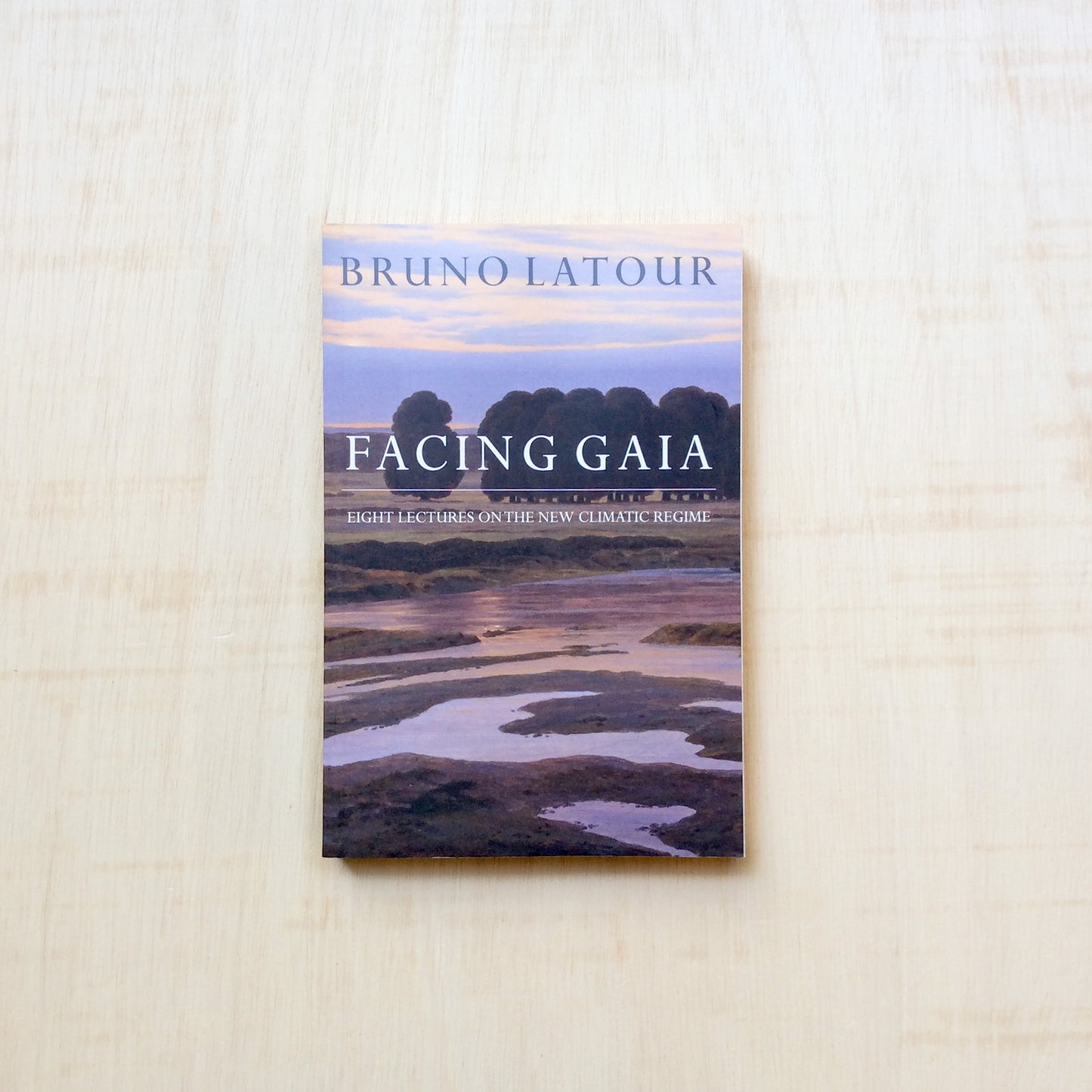Facing Gaia - Eight Lectures on the New Climatic Regime
Facing Gaia - Eight Lectures on the New Climatic Regime
Bruno Latour
Polity Press
2017
9780745684345Softcover
23 x 15 x
300 pages
Couldn't load pickup availability
A favourite book of Yasmine-Ostendorf-Rodriguez, selected for our 2017 Rewind.
The emergence of modern sciences in the seventeenth century profoundly renewed our understanding of nature. For the last three centuries new ideas of nature have been continually developed by theology, politics, economics, and science, especially the sciences of the material world. The situation is even more unstable today, now that we have entered an ecological mutation of unprecedented scale. Some call it the Anthropocene, but it is best described as a new climatic regime. And a new regime it certainly is, since the many unexpected connections between human activity and the natural world oblige every one of us to reopen the earlier notions of nature and redistribute what had been packed inside. So the question now arises: what will replace the old ways of looking at nature? This book explores a potential candidate proposed by James Lovelock when he chose the name 'Gaia' for the fragile, complex system through which living phenomena modify the Earth. The fact that he was immediately misunderstood proves simply that his readers have tried to fit this new notion into an older frame, transforming Gaia into a single organism, a kind of giant thermostat, some sort of New Age goddess, or even divine Providence. In this series of lectures on 'natural religion,' Bruno Latour argues that the complex and ambiguous figure of Gaia offers, on the contrary, an ideal way to disentangle the ethical, political, theological, and scientific aspects of the now obsolete notion of nature. He lays the groundwork for a future collaboration among scientists, theologians, activists, and artists as they, and we, begin to adjust to the new climatic regime. Contents Introduction First Lecture: On the Instability of the (Notion of) Nature A mutation of the relation to the world ¥ Four ways to be driven crazy by ecology ¥ The instability of the nature/culture relation ¥ The invocation of human nature ¥ The recourse to the "natural world" ¥ On a great service rendered by the pseudo-controversy over the climate ¥ "Go tell your masters that the scientists are on the warpath!" ¥ In which we seek to pass from "nature" to the world ¥ How to face up Second Lecture: How Not to (De-)Animate Nature Disturbing "truths" ¥ Describing in order to warn ¥ In which we concentrate on agency ¥ On the difficulty of distinguishing between humans and nonhumans ¥ "And yet it moves!" ¥ A new version of natural law ¥ On an unfortunate tendency to confuse cause and creation ¥ Toward a nature that would no longer be a religion? Third Lecture: Gaia, a (Finally Secular) Figure for Nature Galileo, Lovelock: Two symmetrical discoveries ¥ Gaia, an exceedingly treacherous mythical name for a scientific theory ¥ A parallel with Pasteur's microbes ¥ Lovelock too makes micro-actors proliferate ¥ How to avoid the idea of a system? ¥ Organisms make their own environment, they do not adapt to it ¥ On a slight complication of Darwinism ¥ Space, an offspring of history Fourth Lecture: The Anthropocene and the Destruction of (the Image of) the Globe The Anthropocene: an innovation ¥ Mente et Malleo ¥ A debatable term for an uncertain epoch ¥ An ideal opportunity to disaggregate the figures of Man and Nature ¥ Sloterdijk or the theological origin of the image of the Sphere ¥ Confusion between Science and the Globe ¥ Tyrrell against Lovelock ¥ Feedback loops do not draw a Globe ¥ Finally, a different principle of composition ¥ Melancholia, or the end of the Globe Fifth Lecture: How to Convene the Various Peoples (of Nature)? Two Leviathans, two cosmologies ¥ How to avoid war between the gods? ¥ A perilous diplomatic project ¥ The impossible convocation of a "people of nature" ¥ How to give negotiation a chance? ¥ On the conflict between science and religion ¥ Uncertainty about the meaning of the word "end" ¥ Comparing collectives in combat ¥ Doing without any natural religion Sixth Lecture: How (Not) to Put an End to the End of Times? The fateful date of 1610 ¥ Stephen Toulmin and the scientific counter-revolution ¥ In search of the religious origin of "disinhibition" ¥ The strange project of achieving Paradise on Earth ¥ Eric Voegelin and the avatars of Gnosticism ¥ On an apocalyptic origin of climate skepticism ¥ From the religious to the terrestrial by way of the secular ¥ A "people of Gaia"? ¥ How to respond when accused of producing "apocalyptic discourse" Seventh Lecture: The States (of Nature) between War and Peace The "Great Enclosure" of Caspar David Friedrich ¥ The end of the State of Nature ¥ On the proper dosage of Carl Schmitt ¥ "We seek to understand the normative order of the earth" ¥ on the difference between war and police work ¥ How to turn around and face Gaia? ¥ Human versus Earthbound ¥ Learning to identify the struggling territories Eighth Lecture: How to Govern Struggling (Natural) Territories? In the Theater of Negotiations, Les Amandiers, May 2015 ¥ Learning to meet without a higher arbiter ¥ Extension of the Conference of the Parties to Nonhumans ¥ Multiplication of the parties involved ¥ Mapping the critical zones ¥ Rediscovering the meaning of the State ¥ Laudato Si' ¥ Finally, facing Gaia ¥ "Earth, earth!" Works Cited

